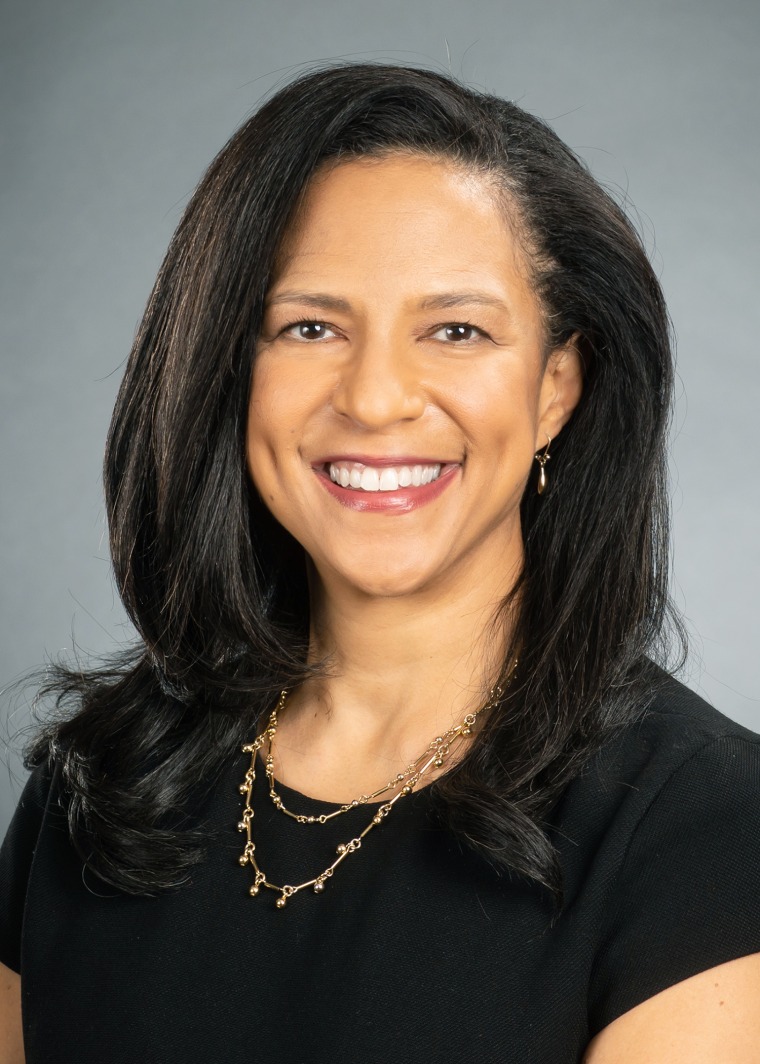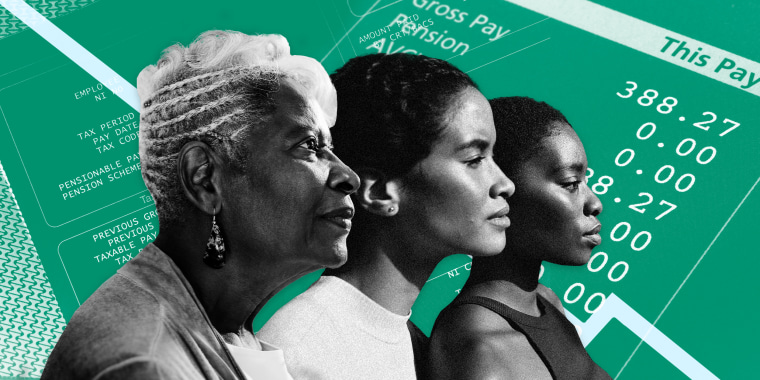Susan Somersille Johnson is a titan in the marketing world and has established herself as a leader who isn’t afraid to make her voice heard. So, it’s surprising to many when they find out she was a shy introvert early on in her career.
“I became an electrical engineer, and I studied really hard. But I didn't build those skills that I think young women need,” Somersille Johnson, 55, recently told Know Your Value founder Mika Brzezinski. “I was painfully shy ... I couldn't talk to you like I'm talking right now. I got into the workforce and nobody looked like me. In the company, there was only one other young Black woman,” she explained.

Partially thanks to a mentor who gave her specific networking and confidence-building exercises, Somersille Johnson found her voice — and eventually her calling as chief marketing officer for Prudential Financial Inc., where she leads the company’s global marketing and brand strategy.
Somersille Johnson chatted with Brzezinski about how she learned to get out of her comfort zone, how she made the pivot from the tech world to marketing, how the past year has changed her, her best advice for young women of color and more.
Here’s their conversation, which has been edited for brevity and clarity:
Mika Brzezinski: It’s been a monumental year, to say the least. How has it changed you, and has it changed the way you operate?
Susan Somersille Johnson: What this year has done for me is it empowered me to speak more about my perspective as a Black woman, which I didn't do as much before.
It was because of Black Lives Matter and seeing the youth protesting every day. It impacted people at all levels of all organizations and for me personally. I've never said the phrase "as a Black woman," as many times in my entire career, as I have in the last year. I express my opinion as a Black woman now … I understand systemic racism and I feel the duty to do something about it.
Brzezinski: As you were sharing your opinion more and pushing others to do so, what were some of the stumbling blocks, if any, you encountered along the way? And what was the advice you were giving to women of color around you?
Somersille Johnson: … What we need to do now is be ever-present because the issue of gender equity and racial equity is so visible right now. And for me that means being intentional about building social capital.
…My mother was an immigrant from Jamaica. She had a really rough time, worked a lot of jobs, put her education on hold to bring her siblings to this country and then went to go back to school. I give you that background because education is deeply ingrained in my life. I became an electrical engineer, and I studied really hard. But I didn't build those skills that I think young women need. I was painfully shy .... I couldn't talk to you like I'm talking right now. I got into the workforce and nobody looked like me. I was an engineer. In the company, there was only one other young Black woman …
… My mentor would give me homework and she would say, "Next time we meet, I want to know how many people in the organization you met, what levels of organization, and what you talked about." And so, I started. Wherever I traveled, whatever site I went to, I intentionally put on the calendar [meetings with] people, leaders in that building, wherever they were that I didn't work with. And I talked about what I'm doing and what my team was doing and what we're accomplishing. I did it all around the globe, and it worked so well. I tell you, within a year I got a call from somebody, literally half a world away from me who said, "Would you like to take this tremendous role leading marketing across 50 company countries?" … I think it's because of all those connections that I had made … [My advice is to] just put [those meetings] on the calendar. Schedule it in. Be intentional about it.
Brzezinski: What you’re saying is something that I preach all the time. My version of that is to make sure you step outside your comfort zone every day. And if you're afraid of meeting people, if you are shy, that's OK. But you're going to have to learn to speak for yourself. And to be able to grow in whatever kind of company you're working at, you have to be able to speak and communicate effectively, or at least find a way to get to know people.
I'm wondering how shy Susan went from being an engineer to jumping into the role you're in now. How did you manage that pivot? Was it frightening?
Somersille Johnson: ... I just started working for Apple. I was an engineer and was literally tapped on the shoulder and asked, "would you consider a role in marketing?" And that was frightening, intimidating to me. My comfort zone was numbers and science. I had no idea I had potential in marketing.
And so, I did two things … I sat down and talked to myself and I said, "Susan, you have an opportunity here to learn marketing at Apple. Are you going to take it? This is going to be a risk. It could fail. Are you going to take this opportunity?" And then the second thing I did is really listened … I listened to other people. So the person who told me I had this talent that I never knew, I really listened to him. I sat with him … I took the leap …. And I'm so happy now because I love the power of marketing … We can impact the world.
Brzezinski: It’s wonderful you found your place and where you want to be. What do you say to women who struggle with constructive criticism? Tell me about how you handle giving or receiving constructive criticism.
Somersille Johnson: I like to think that I'm very good at taking constructive criticism, but [it can be] hard for me.
The way [researcher] Brenè Brown talks about perfectionism really helps. There's a big difference between perfectionism and striving for excellence. And so now I think I strive for excellence, much more instead of perfectionism, which [doesn’t focus on] criticism and judgment and shame. I share that with a lot of people, because it clicked for me.
I want to strive for excellence because that's a lot more fun. And then in terms of when I give constructive feedback, I noticed I learned the hard way, what you just described, that people go into this emotional state and then they don't hear you. I try to … find some positive things first, so that they see how invested I am in building this relationship. And then I talk about what needs to improve.
Brzezinski: I’d like to go back to where we started and talk about diversity and inclusion — and trying to build a better workplace. You said given the past year, it felt like something needed to change with you after watching Black Lives Matter protests and everything that was happening in our country. What do you think managers can do to understand and retain a diverse workforce?
Somersille Johnson: … I think the barrier still continues to be opportunity. The perception that women can't do the same role, or people of color can't do the same role. Well, what I say to leaders, and this is what I've come to over the past year is when everybody says to me, "how do I integrate my company? How do I integrate my organization?" And my answer is you have to integrate your life.
And it came to me. I had to talk to so many people. I met [social justice activist and lawyer] Bryan Stevenson … And he talks about proximity. He's saying, "if you're not close enough to the issue, you're not going to care enough about it to change it because this is hard work. You have to be really close.” … But I think that that's important, so that you're closer to the issue and you will change it.
Brzezinski: What about specific advice for women of color who are following in your footsteps? Any advice that you have that you can impart upon them? Either making sure that they don't fall off track or leave before their time comes? Because we lost a lot of women in this pandemic, especially Black and brown women who are leaving their jobs or getting pushed out
Somersille Johnson: … I think for a lot of us, it's difficult to talk about our successes and the value that we bring. And so what I advise all women is, your leader needs you more than you know. They need your information, your eyes and ears and your talent. So, they need you to tell them about your success, what's working in your group and your team ... When Black women do that, they're seen, they're heard and they're promoted. And then they stay.
